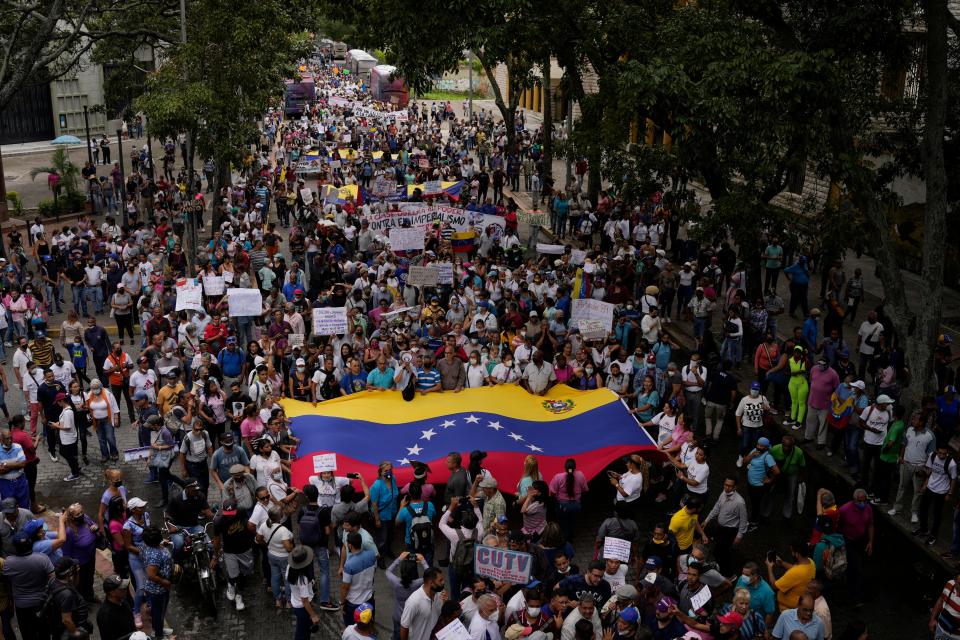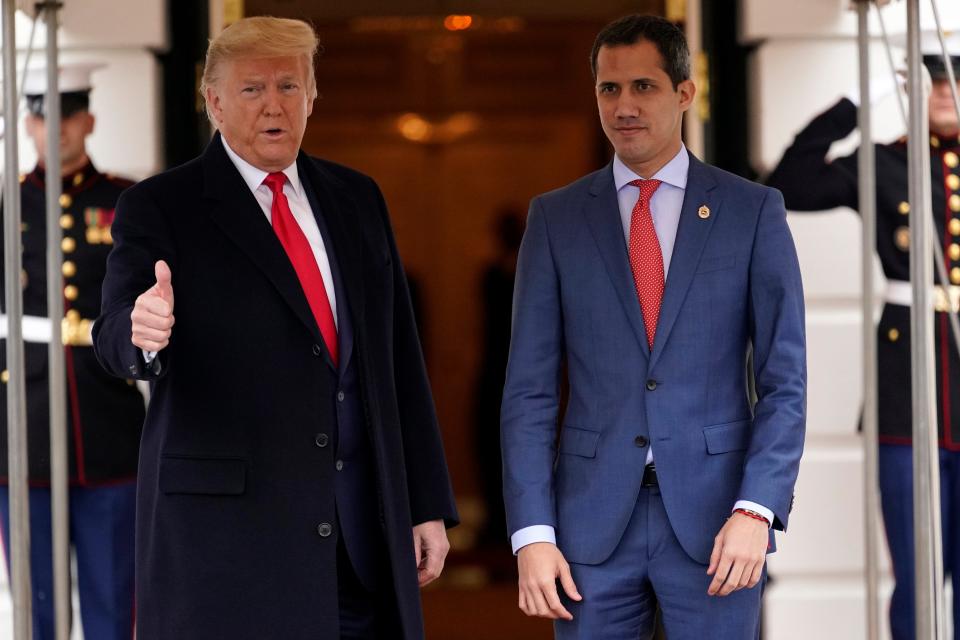Venezuelans are a growing Latino group in the US. Can they recreate the Cuban American voter playbook?
WASHINGTON – Ahead of the 2020 presidential election, former President Donald Trump was making gains with the Cuban American voters in South Florida. With those votes locked in, he set his sights on another promising group: Venezuelan Americans.
His campaign and other conservatives focused on their growing fears of socialism and political unrest in the United States. This resonated among many Venezuelan Americans, whose South American country has been governed by a socialist government since 1999.
It worked. Trump won 52% of Latino voters in Miami and the Gold Coast, laying the groundwork for Venezuelan Americans to follow in the footsteps of Cuban Americans and become politically influential in Washington.
Unlike immigrants from other Latin American countries, Cuban Americans charted a different course – born out of the U.S. relations with the Caribbean island during the Cold War. Since the 1960s, Cuban Americans were granted political asylum and legal status that eventually turned them into citizens. They created lobby groups, got legislators to pass landmark laws and ultimately ran for elected office, effectively solidifying the voting bloc’s importance in the nation's politics.
While the population of Venezuelan Americans is much smaller, the community has grown by at least 54% since 2015. It is also a community that is currently seeing an exodus of many citizens much like that of Cuba after the Cuban Revolution in 1959.
‘Half an American dream’: DACA was meant to be temporary. 10 years later, immigrants want relief.
Some experts are already seeing signs of recreating the Cuban American playbook in politics, which has become a key voting bloc in the presidential elections.
“They're going to become voters very soon in four or five years, and they're going to be as influential as the Cuban voters,” said Joaquín Pérez Rodríguez, a political commentator based in Florida who was a political activist in Cuba and Venezuela, said of Venezuelan American voters in the United States.

The growing Venezuelan population in the United States
Venezuelans are among the fastest growing Latino groups in the United States.
According to Pew Research Center, the population saw an increase of 126% to 540,000 from 2010 to 2019.
But in the past year, there has been an increase of Venezuelans migrating to the United States due to political unrest in the country.
Unlike Cuban exiles, however, Venezuelans coming to the United States have not seen the same policies in the immediate that helped establish Cubans exiles in the United States.
Character loans were dispensed to Cubans which allowed them to start small businesses. A Cuban Refugee program was also established that provided assistance to Cubans who fled their home country.
With thousands of Cubans fleeing their home country at the time, Congress also went on to pass a bipartisan bill called the Cuban Adjustment Act in 1966. The legislation granted work permits and allowed Cuban natives or citizens who had been in the United States for at least a year to get lawful permanent residency.
In Florida, there is an estimate of about 100,000 to 125,000 voters who are of Venezuelan descent, according to Fernand Amandi, managing partner of Bendixen & Amandi, a political consulting firm.
Dario Moreno, associate professor of politics and international relations at Florida International University, estimates that about 25,000 to 50,000 of voters are Venezuelan in Dade and Broward County.
Freight rail shutdown?: Pressure mounts on Biden to avert freight rail strike as union deadline looms
Moreno said there is alignment with other voting groups who have seen similar unrest in their home countries. In that same vein, the Republican party promotes a right-wing anti-socialist Latin American policy that not only resonates with these voters but oils the GOP's political engine in the Sunshine State.
“They're growing. They're involved in politics,” Moreno said of Venezuelan Americans. “And there's a sort of forming coalition right now with Cubans, Colombians and Nicaraguans who are upset over what's going on in their own country.”
Venezuela's economy had long suffered from extreme inflation compounded by falling oil prices and increasing authoritarianism.
But the country was rocked by political unrest as the legitimacy of Nicolás Maduro's presidency has been in dispute since 2019.
In an attempt to drive out Maduro, Trump led an international coalition imposing sanctions which drove down the price of Venezuela's oil – the country's main source of cash – leading to widespread shortages of everything from medicine to toilet paper.
Much like Cuban Americans who have pressed lawmakers to uphold the U.S. embargo on Cuba imposed since 1962, Venezuelan Americans hailed Trump's iron fist approach.
“A lot of Venezuelans have been affected by the Cuban process,” Pérez Rodríguez said. “They think like Cubans. For example, in U.S. politics, they think they are Republicans. They believe in Trump. They thought that Trump was going to liberate Venezuela.”
The Trump administration recognized Carlos Vecchio as Ambassador of Venezuela to the United States. Vecchio was designated by Juan Guaidó, whom the United States recognizes as interim president of Venezuela. The Trump administration was among the first governments to recognize Guaidó as interim president.
More: Free bus rides for migrants to Washington, New York and Chicago begin in Texas border town
The Biden administration continues to support Guaidó as Venezuela’s interim president. While the Biden administration declined to invite officials from Cuba, Venezuela and Nicaragua to the Summit of the Americas in June, Biden held a call with Guaidó at the time to reaffirm the United States support.
But the support for Guaidófrom the United States government wasn't haphazard.
Like Cuban Americans who formed various political action committees, Venezuelan Americans have also created advocacy groups, such as Independent Venezuelan-American Citizens (IVAC) and Venezuelan American Alliance, to engage members of Congress on securing democracy in their home countries.

Running for office
And Venezuelan American involvement in politics is only growing.
With some of the gains conservatives made in 2020 with Latinos, especially Cuban Americans in Florida, some strategists believe that the same groundwork is being laid to garner support among Venezuelan Americans.
“As the Venezuelan population continues to grow and as more enter the electorate I think they do see a model in how the Cuban American and the Cuban exile community have been able to marshal their voice to become a powerful force,” Amandi said.
However, he noted that it’s still too early to tell the type of influence that Venezuelan Americans will have on the American electorate.
Amandi said that for the Cuban exile community, for the first 20 to 25 years many believed they would be able to return or dreamt of going back to Cuba. Now, many Cuban Americans see the United States as their home and have become more active and engaged in what’s happening in the United States, Amandi said.
Moreno noted that Venezuelans are following the same lead as Cuban exiles did, by concentrating the population in certain areas. For example, he said that many Venezuelans are also concentrating in South Florida, such as Doral, a municipality in Miami-Dade County.
Amandi said that the next determiner of whether Venezuelan Americans can recreate the political force Cuban Americans have will be the cultivation of Venezuelan activists and political figures.
DACA rule: DACA recipients granted greater protection thanks to new federal rule, as policy made into law
Many Cuban Americans have run for office. In fact, former Rep. Ileana Ros-Lehtinen made history as the first Latina woman elected to Congress in 1989.
Currently, Rep. Mario Díaz-Balart, a Republican represents Florida's 25th congressional district, and Sens. Bob Menendez, D-N.J., and Marco Rubio, R-Florida.
In the last election cycle, there was an increase of Venezuelan Americans running for office.
The Miami Herald reported in 2020 that Venezuelan Americans were seeking mayoral or commission seats in not only South Florida, but in cities like Orlando and even other states across the country like Texas.
“I think a lot of it will be determined by events that take place in Venezuela,” he said. “As they decide do they want to fully enter American life, not just as citizens but also as voters, I think you might see those numbers increase and have an even greater impact potentially."
Reach Rebecca Morin at Twitter @RebeccaMorin_
This article originally appeared on USA TODAY: Can Venezuelans recreate the Cuban American voter playbook?

